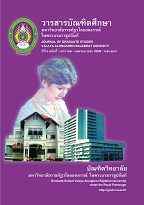การพัฒนารูปแบบการส่งเสริมคุณธรรมจริยธรรมในสถานศึกษาระดับประถมศึกษา DEVELOPMENT OF INSTRUCTIONAL LEADERSHIP FOR EARLY CHILDHOOD SCHOOL
Main Article Content
Abstract
บทคัดย่อ
การวิจัยนี้มีวัตถุประสงค์เพื่อสร้างกระบวนการการพัฒนาภาวะผู้นำทางวิชาการสำหรับผู้บริหารสถานศึกษาปฐมวัย กลุ่มตัวอย่างในการศึกษา ได้แก่ ผู้บริหารสถานศึกษาเอกชนสังกัดสำนักงานคณะกรรมการส่งเสริมการศึกษาเอกชน ที่เปิดสอนในระดับปฐมวัยในเขตปริมณฑลประกอบด้วย 5 จังหวัด คือ ปทุมธานี นนทบุรีสมุทรปราการ สมุทรสาครและนครปฐม จำนวนทั้งสิ้น 152 คน กลุ่มผู้เชี่ยวชาญซึ่งเป็นผู้บริหารสถานศึกษาที่มีผลงานดีเด่นด้านการบริหารงานวิชาการในระดับปฐมวัย จำนวน 13 คน สำหรับเครื่องมือที่ใช้ในการเก็บข้อมูล คือ แบบสัมภาษณ์เชิงลึกแบบสอบถามและการสนทนากลุ่มเป็นการวิจัยเชิงบรรยาย (Descriptive Research) วิเคราะห์ข้อมูลโดยใช้โปรแกรมสำเร็จรูป เพื่อวิเคราะห์สถิติพื้นฐาน โดยใช้โปรแกรมสำเร็จรูปทางสถิติแจกแจงความถี่ หาค่าร้อยละ ค่าเฉลี่ยและค่าส่วนเบี่ยงเบนมาตรฐาน
ผลการศึกษาพบว่า
1. คุณลักษณะผู้นำทางวิชาการที่เหมาะสมและสอดคล้องกับพฤติกรรมผู้นำทางวิชาการสำหรับผู้บริหารสถานศึกษาปฐมวัยมีจำนวน 36 พฤติกรรม 36 คุณลักษณะ จำแนกเป็น 4 ด้าน คือคุณลักษณะผู้นำด้านวิชาการ คุณลักษณะผู้นำด้านการบริหารจัดการ คุณลักษณะผู้นำด้านบุคลิกภาพและคุณลักษณะผู้นำด้านคุณธรรม-จริยธรรม
2. องค์ประกอบของกระบวนการการพัฒนาภาวะผู้นำทางวิชาการสำหรับผู้บริหารสถานศึกษาปฐมวัยมีความเหมาะสมและมีความเป็นไปได้ ซึ่งประกอบด้วย 4 องค์ประกอบ ได้แก่ที่มาของกระบวนการ คุณลักษณะผู้นำที่ต้องการพัฒนา กระบวนการการพัฒนาภาวะผู้นำทางวิชาการและการนำกระบวนการการพัฒนาภาวะผู้นำทางวิชาการไปใช้
3. กระบวนการการพัฒนาภาวะผู้นำทางวิชาการสำหรับผู้บริหารสถานศึกษาปฐมวัยมีกระบวนการดำเนินงาน 5 ขั้นตอนคือ ขั้นตอนที่1 การประเมินความต้องการจำเป็นในการพัฒนาขั้นตอนที่ 2 การเตรียมการพัฒนา ขั้นตอนที่3 การดำเนินการพัฒนา ประกอบด้วย 4 ด้าน คือ การพัฒนาคุณลักษณะผู้นำด้านวิชาการ การพัฒนาคุณลักษณะผู้นำด้านการบริหารจัดการ การพัฒนาคุณลักษณะผู้นำด้านบุคลิกภาพและการพัฒนาคุณลักษณะผู้นำด้านคุณธรรม-จริยธรรม ขั้นตอนที่4 การประเมินผลและการติดตามผลการพัฒนาในแต่ละขั้นตอนของกิจกรรมการพัฒนาและขั้นตอนที่ 5 การประเมินผลการดำเนินการในภาพรวม ซึ่งแต่ละขั้นตอนประกอบด้วย แนวคิด วัตถุประสงค์ วิธีการกิจกรรมการพัฒนาและผลที่คาดหวัง
ABSTRACT
The purpose of this descriptive research was to make a process of development of instructional leadership for early childhood school administrators. The subjects of this study comprised 152 administrators of early childhood schools under office of the Private Education Commission in suburban area consisting of 5 provinces such as Pathum Thani, Nonthaburi, Samut Prakan, Samut Sakhon, and Nakhon Pathom and 13 experts which were best practices in instructional administration of early childhood. The data were collected by in-depth interview, questionnaire, and focus group which was descriptive research. The collected data were analyzed by frequency, percentage, mean, and standard deviation
The results of this research were as follows:
1. The thirty-six leadership traits which were appropriate and correspondent with the leadership roles were categorized into four groups including instructional leadership traits, professional leadership traits, personality leadership traits and ethical leadership traits.
2. The component of a leadership development process for early childhood school administrators that was possible and appropriate consisted of four parts as follows : 1) the derivation of the process, 2) the leadership traits needed to be developed, 3) the process of development, and 4) the application of the process.
3. The process of leadership traits development comprised five stages including 1) the need assessment, 2) the preparation, 3) the procedure of process development consisting of four processes as follows: 3.1) the instructional leadership traits development, 3.2) the professional leadership traits development, 3.3) the personality leadership traits development, and 3.4) the ethical leadership traits development, 4) technique and evaluation and follow-up of the process development, and 5) evaluation of the whole process of development which each stage consisted of concept, objective, procedure and expectation.
Article Details

This work is licensed under a Creative Commons Attribution-NonCommercial-NoDerivatives 4.0 International License.
บทความทุกเรื่องได้รับการตรวจความถูกต้องทางวิชาการโดยผู้ทรงคุณวุฒิ ทรรศนะและข้อคิดเห็นในบทความ Journal of Global of Perspectives in Humanities and Social Sciences (J-GPHSS) มิใช่เป็นทรรศนะและความคิดของผู้จัดทำจึงมิใช่ความรับผิดชอบของบัณฑิตวิทยาลัย มหาวิทยาลัยราชภัฏวไลยอลงกรณ์ ในพระบรมราชูปถัมภ์ กองบรรณาธิการไม่สงวนสิทธิ์การคัดลอก แต่ให้อ้างอิงแหล่งที่มา


